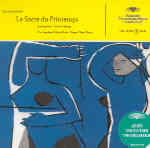Ferenc Fricsay’s 1953/54 recordings of Le sacre du printemps and Petrouchka hold their own even by today’s hi-tech standards for their wide dynamic range and realistic ambience. This particularly applies to Sacre, but it’s the less persuasive performance of the two. For starters, balances between orchestral sections are often skewed. Part One’s Introduction resembles an English horn concerto bracketed by an unsteady solo bassoonist. The Danse des adolescentes moves too sluggishly to gain momentum or to allow the fierce block chords to securely lock in. Jeu du rapt is conspicuous for poor trombone and trumpet work, while the Danse de la terre’s whirling strands fly in and out of focus. Still, I like how the low winds and coarse brass sonorities convey the primeval sound-world Stravinsky had in mind, such as in Action rituelle des ancêstres, and in Danse sacrale’s snarling crescendos.
For whatever reasons, the orchestra appears to broach Petrouchka’s polytextural mazes more securely. The players admirably brave Fricsay’s brisker than customary tempos in the opening section and bring astringent vivacity to Féte populaire de la semaine grasse. At the same time, the extensive instrumental solos don’t match today’s level of execution (the march for trumpet in Chez le Maure, for example), or even that of the New York pick-up orchestra gracing Leopold Stokowski’s 1950 RCA recording (reissued on Testament). In all, there’s always something to learn from Fricsay, even if these recordings fall short of his stunning achievements in other 20th-century fare, such as Bartók’s Piano Concertos and Rachmaninov’s Paganini Rhapsody.
































